Unit 1 How can we become good learnersSection A1a-2d 课件(共37张PPT,含听力音频)人教版英语九年级全册
文档属性
| 名称 | Unit 1 How can we become good learnersSection A1a-2d 课件(共37张PPT,含听力音频)人教版英语九年级全册 |

|
|
| 格式 | pptx | ||
| 文件大小 | 9.1MB | ||
| 资源类型 | 教案 | ||
| 版本资源 | 人教新目标(Go for it)版 | ||
| 科目 | 英语 | ||
| 更新时间 | 2023-10-03 00:00:00 | ||
图片预览

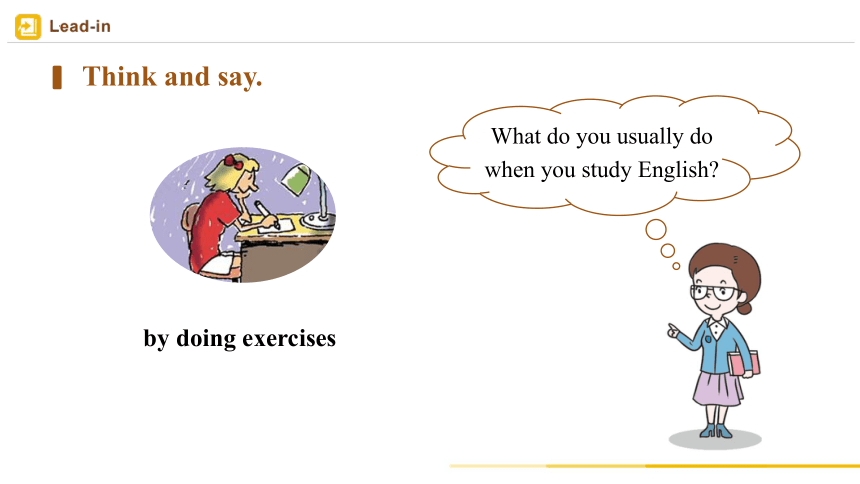
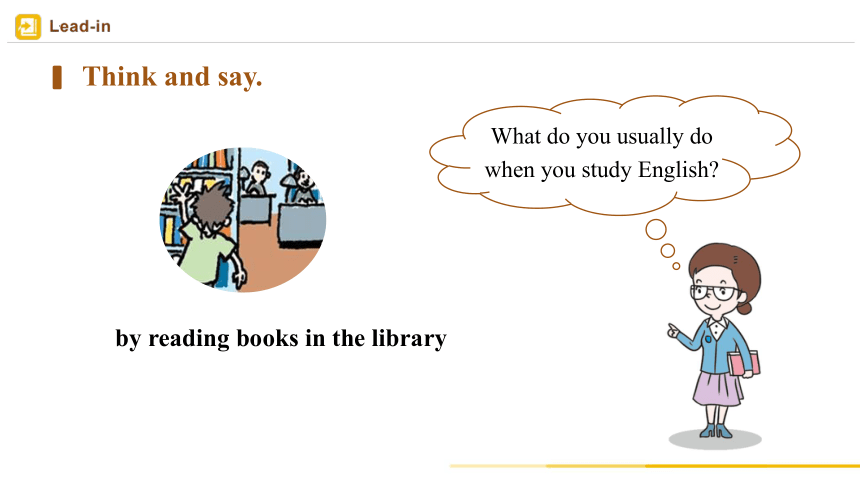

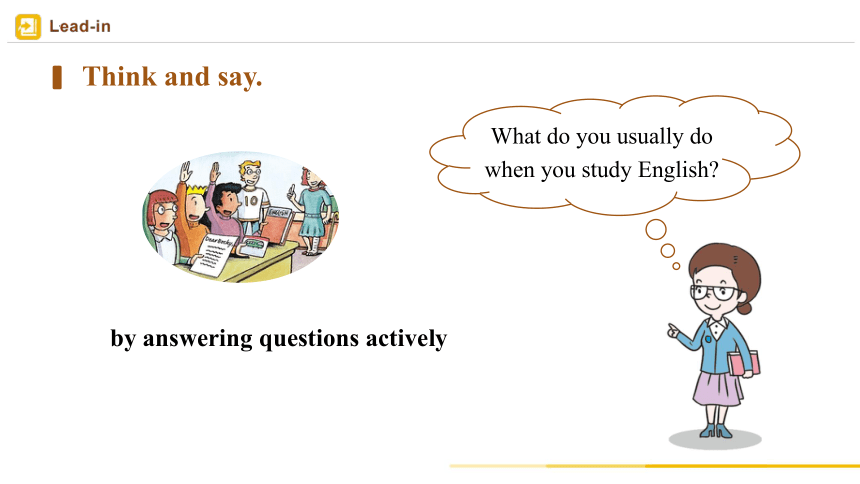

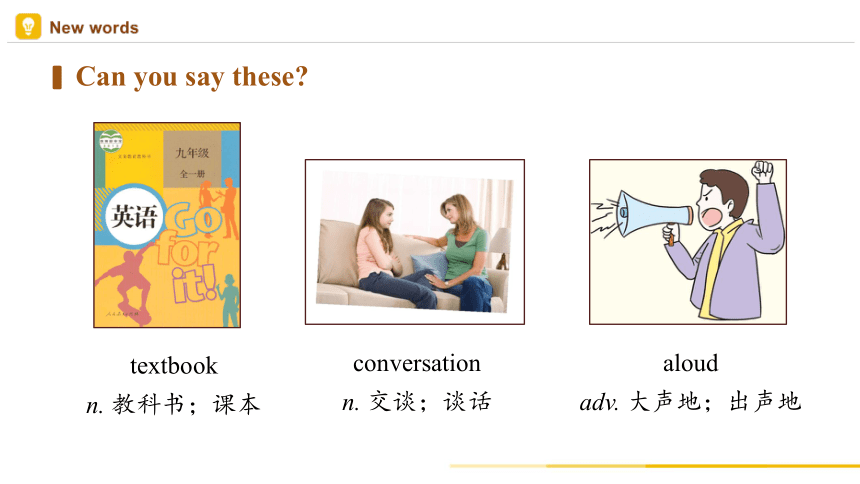
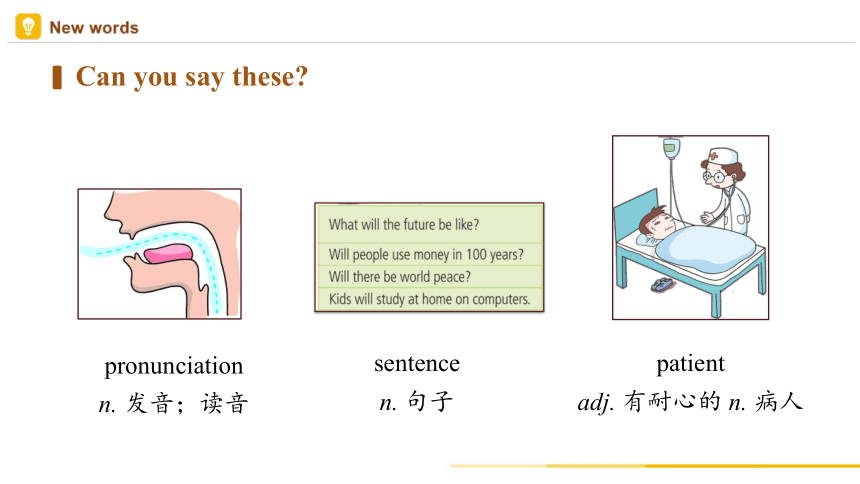
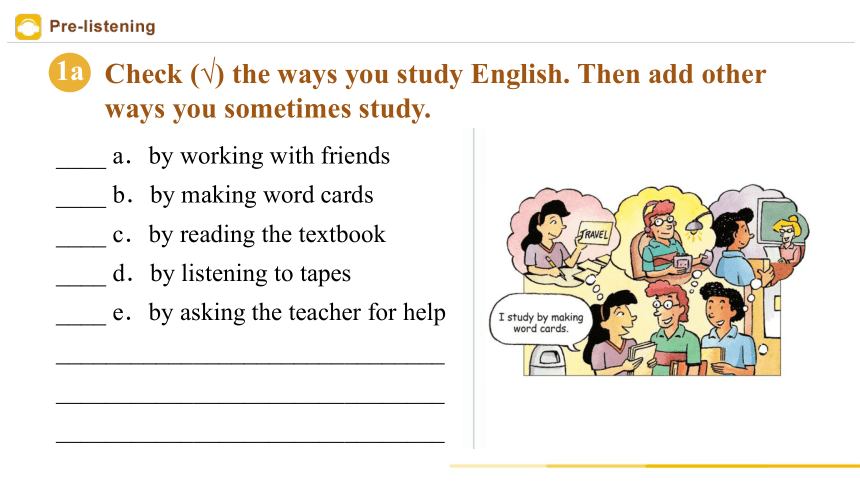
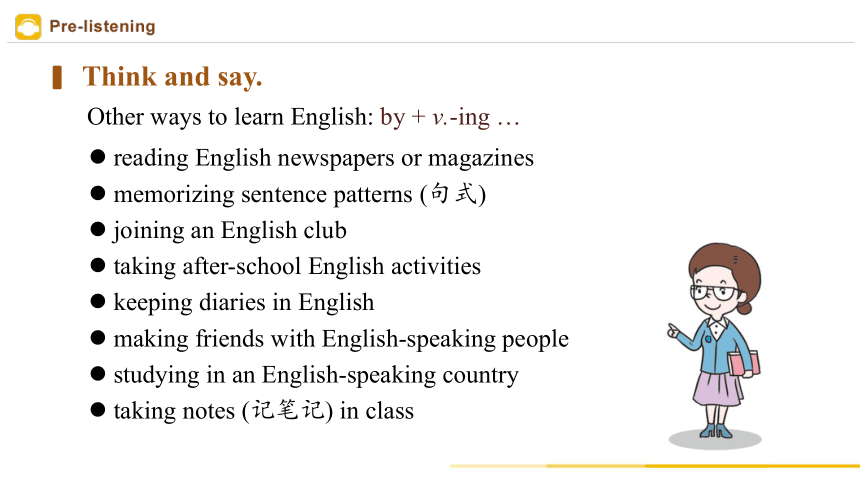
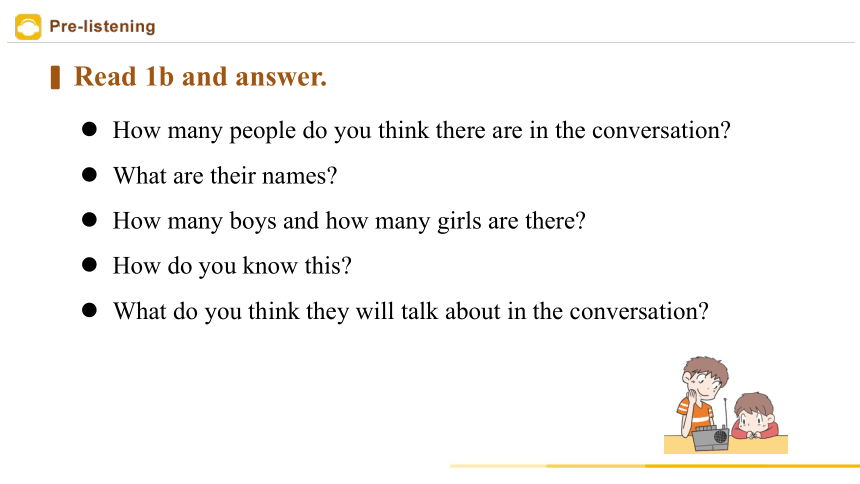
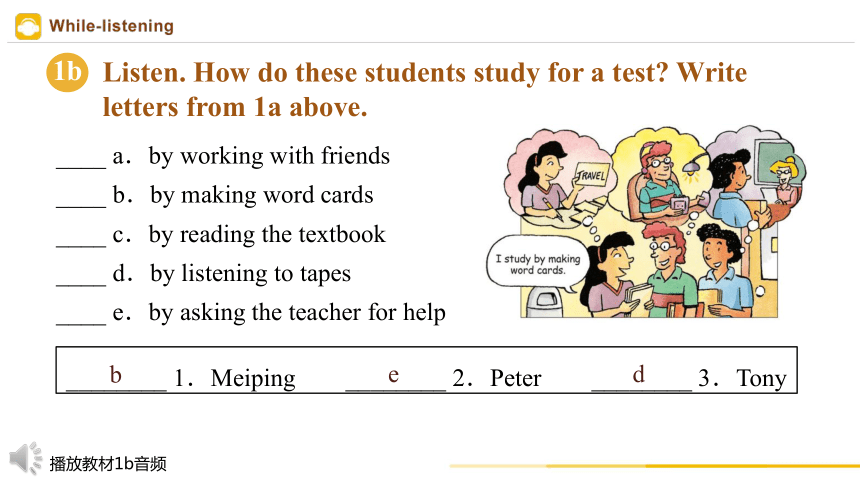
文档简介
(共37张PPT)
Unit 1 How can we become good learners
(Period 1)
Section A (1a-2d)
What do you usually do when you study English
Think and say.
by doing exercises
by reading books in the library
What do you usually do when you study English
Think and say.
by watching English movies
What do you usually do when you study English
Think and say.
by answering questions actively
What do you usually do when you study English
Think and say.
What do you usually do when you study English
by asking others for help
Think and say.
textbook
n. 教科书;课本
conversation
n. 交谈;谈话
aloud
adv. 大声地;出声地
Can you say these
pronunciation
n. 发音;读音
sentence
n. 句子
patient
adj. 有耐心的 n. 病人
Can you say these
Check (√) the ways you study English. Then add other ways you sometimes study.
1a
____ a.by working with friends
____ b.by making word cards
____ c.by reading the textbook
____ d.by listening to tapes
____ e.by asking the teacher for help
_______________________________
_______________________________
_______________________________
Other ways to learn English: by + v.-ing …
reading English newspapers or magazines
memorizing sentence patterns (句式)
joining an English club
taking after-school English activities
keeping diaries in English
making friends with English-speaking people
studying in an English-speaking country
taking notes (记笔记) in class
Think and say.
Read 1b and answer.
How many people do you think there are in the conversation
What are their names
How many boys and how many girls are there
How do you know this
What do you think they will talk about in the conversation
1b
Listen. How do these students study for a test Write letters from 1a above.
e
b
d
播放教材1b音频
________ 1.Meiping ________ 2.Peter ________ 3.Tony
____ a.by working with friends
____ b.by making word cards
____ c.by reading the textbook
____ d.by listening to tapes
____ e.by asking the teacher for help
Read after 1b.
播放教材1b音频
Boy: Hey, everybody. There’s a big test on Tuesday. I really need
some help. Can you tell me how you study for a big test
Voices: Sure! Yes. Sure we will.
Boy: You did really well on the last English test, didn’t you,
Meiping
Meiping: Yeah, I did OK.
Boy: Well, how did you study for it
Meiping: By making word cards.
Read after 1b.
播放教材1b音频
Boy: Maybe I’ll try that. So, how do you study for a test, Peter
Peter: By asking the teacher for help. She’s always happy to answer
my questions.
Boy: That’s interesting. How do you study, Tony
Tony: I like to study by listening to tapes. But sometimes my mother
thinks I’m listening to music. And then she gets mad.
Boy: Oh, maybe I won’t do that then.
Make conversations about how you study for a test.
1c
A: How do you study for a test
B: I study by working with a group.
Listen and check (√) the questions you hear.
2a
Questions Answers
1.____ Does anyone learn English by watching videos ______
2.____ Do you have conversations with friends in English ______
3.____ What about listening to tapes ______
4.____ What about reading aloud to practice pronunciation ______
5.____ Have you ever studied with a group ______
播放教材2a音频
√
√
√
√
播放教材2b音频
Listen again. Match each answer below with a question above.
2b
a.Yes, I have. I’ve learned a lot that way.
b.Oh, yes. It really improves my speaking skills.
c.I do that sometimes. I think it helps.
d.No. It’s too hard to understand spoken English.
Listen again. Match each answer below with a question above.
2b
Questions Answers
1.____ Does anyone learn English by watching videos ______
2.____ Do you have conversations with friends in English ______
3.____ What about listening to tapes ______
4.____ What about reading aloud to practice pronunciation ______
5.____ Have you ever studied with a group ______
d
b
c
a
Read after 2b.
播放教材2b音频
Man: Welcome to the English club. Today we’re going to talk about
the best ways to learn English. Does anyone learn English by
watching videos
Girl 1: No. It’s too hard to understand spoken English.
Boy 1: What about keeping a diary in English Do you learn English
that way
Girl 1: Yes, I do. It helps to write English every day.
Read after 2b.
播放教材2b音频
Boy 2: Have you ever studied with a group
Girl 2: Yes, I have! I’ve learned a lot that way.
Boy 2: Do you have conversations with friends in English
Girl 2: Oh, yes. It really improves my speaking skills.
Girl 1: What about reading aloud to practice pronunciation
Boy 1: I do that sometimes. I think it helps.
Girl 2: I do, too. And I often look up new words in a dictionary.
Boy 2: That’s a great idea!
A: Have you ever studied with a group
B: Yes, I have. I’ve learned a lot that way.
Make conversations using the information in 2a and 2b.
2c
Questions Answers
Does anyone learn English by watching videos No. It’s too hard to understand spoken English.
Do you have conversations with friends in English Oh, yes. It really improves my speaking skills.
What about reading aloud to practice pronunciation I do that sometimes. I think it helps.
Have you ever studied with a group Yes, I have. I’ve learned a lot that way.
1.What are the names of the girl and boy in the conversation
2.Why is Jack nervous
3.What’s Annie’s advice for Jack’s problem
Read the conversation of 2d and answer the questions.
They are Annie and Jack.
Because he has to finish reading a book and give a report next
Monday.
Just read quickly to get the main ideas at first and try to guess the words’ meaning.
Jack: Annie, I’m a little nervous. I have to finish reading a book and give a
report next Monday.
Annie: That doesn’t sound too bad.
Jack: But I’m a very slow reader.
Annie: Just read quickly to get the main ideas at first. Don’t read word by
word. Read word groups.
Jack: But I don’t understand many of the words. I have to use a dictionary.
Role-play the conversation.
2d
播放教材2d音频
Annie: Try to guess a word’s meaning by reading the sentences before and
after it. You probably understand more than you think.
Jack: That sounds difficult!
Annie: Well, be patient. It takes time. You can
become better by reading something you
enjoy every day. The more you read, the
faster you’ll be.
Role-play the conversation.
2d
播放教材2d音频
1.by asking the teacher for help 通过向老师求助
(1)by 介词,意为“通过;靠”,此处表示方式、手段,其后可
接名词、代词或动词 -ing 形式。对方式、手段进行提问用 how。
e.g. He had to do the work by hand.
他必须要靠手工完成这项工作。
A man becomes learned by asking questions.
(谚)不耻下问才能有学问。
1. by asking the teacher for help 通过向老师求助
e.g. My mother asked me for help yesterday.
昨天我母亲要我帮忙。
Did anybody ask for me
有人找过我吗
No one asked for my advice.
没有人问我的意见。
(2)ask sb. for help 表示“向某人求助”。ask sb. for sth.“向某人要
某物;要求某人某事”,还可用 ask for sb./sth.,意为“求见某
人/索要某物”。
2.What about reading aloud to practice pronunciation
朗读练习发音呢
(1)What about ... 表示“……怎么样 ”,相当于“How about ... ”,
常用来征求对方的意见或询问情况。其中,about 为介词,后接
名词、代词或动词 –ing 形式。
e.g. I like English. What about you 我喜欢英语。你喜欢吗
What about visiting the East Lake
去游览东湖怎么样
(2)aloud 副词,意为“大声地;出声地”。
They are shouting aloud. 他们在大声喊叫。
2.What about reading aloud to practice pronunciation
朗读练习发音呢
aloud、loud 与 loudly
辨析
aloud 副词 表示“大声地”,常与 call、cry、shout 等词连用
loud 形容词或副词 表示“响亮的;大声的”,可用作定语或表语;表示“响亮地;大声地”,常置于 speak、talk、say、laugh 等动词之后,多用比较级
loudly 副词 表示“喧闹地;大声地”,常与 ring、knock 等动词连用,多含有“嘈杂”之意
2.What about reading aloud to practice pronunciation
朗读练习发音呢
e.g. Reading aloud is different from reading loudly.
朗读课文与大声地读课文是有区别的。
Facts speak louder than words.
事实胜于雄辩。
3.I have to finish reading a book and give a report next Monday.
我必须读完一本书,以便下周一做报告。
finish 动词,“完成”,后跟名词、代词或动词-ing 形式作宾语。
e.g. I finished my homework half an hour ago.
我半小时前就做完作业了。
Have you finished cooking 你做完饭了吗
常接动词-ing 形式作宾语的动词或短语动词
拓展
喜爱练习继续忙(enjoy、practice、keep/keep on、be busy),
建议避免习惯想(advise、avoid、be used to、feel like),
盼望冒险(不)放弃(look forward to、risk、give up),
不禁高兴(别)介意(can’t help、have fun、mind)。
4.That doesn’t sound too bad. 那听起来不算太糟糕。
sound 作连系动词,意为“听起来”,其后常接形容词作表语。
e.g. This piece of music sounds beautiful.
这首乐曲听起来很优美。
His idea sounds really good. 他的主意听起来确实不错。
常考的五个感官动词(连系动词)
归纳
look“看起来”
sound“听起来”
smell“闻起来”
taste“尝起来”
feel“摸起来”
感官动词
5.Well, be patient. 哦,耐心点。
patient 用作形容词,意为“有耐心的”。常用短语:be patient with sb.“对某人有耐心”,be patient of sth. “忍耐某事”。
e.g. You’ll just have to be patient. 你只能耐心点。
We should be patient with them. 我们应该对他们有耐心。
You should learn to be patient of pains. 你应该学会忍受痛苦。
拓展
patient 还可用作名词,意为“病人”。
e.g. Doctors should be patient with patients.
医生应该对病人有耐心。
6.The more you read, the faster you’ll be. 你读得越多,就读得越快。
“the + 比较级 ..., the + 比较级 ...”表示“越……越……”。
e.g. Take nothing for granted. Know that the harder you work, the
luckier you’ll be. 没有事情是理所当然的,需知越努力越幸运。
The more you practice, the better you can understand.
你练习得越多,理解得就越透彻。
拓展
“比较级 + and + 比较级”意为“越来越……”。
e.g. The weather gets colder and colder. 天气变得越来越冷了。
Our city is becoming more and more beautiful.
我们的城市正变得越来越漂亮。
Words
_____________ n. 教科书;课本
_____________ n. 交谈;谈话
_____________ adv. 大声地;出声地
_____________ n. 发音;读音
_____________ n. 句子
_____________ adj. 有耐心的 n. 病人
textbook
conversation
aloud
pronunciation
sentence
patient
1.… by asking the teacher for help.
2.What about reading aloud to practice pronunciation
3.It’s too hard to understand spoken English.
4.I have to finish reading a book and give a report next Monday.
5.That doesn’t sound too bad.
6.Don’t read word by word.
7.The more you read, the faster you’ll be.
Structures and sentences
Remember the new words and expressions we learnt today.
Make up a conversation about how to learn English and practice it with your partner.
Unit 1 How can we become good learners
(Period 1)
Section A (1a-2d)
What do you usually do when you study English
Think and say.
by doing exercises
by reading books in the library
What do you usually do when you study English
Think and say.
by watching English movies
What do you usually do when you study English
Think and say.
by answering questions actively
What do you usually do when you study English
Think and say.
What do you usually do when you study English
by asking others for help
Think and say.
textbook
n. 教科书;课本
conversation
n. 交谈;谈话
aloud
adv. 大声地;出声地
Can you say these
pronunciation
n. 发音;读音
sentence
n. 句子
patient
adj. 有耐心的 n. 病人
Can you say these
Check (√) the ways you study English. Then add other ways you sometimes study.
1a
____ a.by working with friends
____ b.by making word cards
____ c.by reading the textbook
____ d.by listening to tapes
____ e.by asking the teacher for help
_______________________________
_______________________________
_______________________________
Other ways to learn English: by + v.-ing …
reading English newspapers or magazines
memorizing sentence patterns (句式)
joining an English club
taking after-school English activities
keeping diaries in English
making friends with English-speaking people
studying in an English-speaking country
taking notes (记笔记) in class
Think and say.
Read 1b and answer.
How many people do you think there are in the conversation
What are their names
How many boys and how many girls are there
How do you know this
What do you think they will talk about in the conversation
1b
Listen. How do these students study for a test Write letters from 1a above.
e
b
d
播放教材1b音频
________ 1.Meiping ________ 2.Peter ________ 3.Tony
____ a.by working with friends
____ b.by making word cards
____ c.by reading the textbook
____ d.by listening to tapes
____ e.by asking the teacher for help
Read after 1b.
播放教材1b音频
Boy: Hey, everybody. There’s a big test on Tuesday. I really need
some help. Can you tell me how you study for a big test
Voices: Sure! Yes. Sure we will.
Boy: You did really well on the last English test, didn’t you,
Meiping
Meiping: Yeah, I did OK.
Boy: Well, how did you study for it
Meiping: By making word cards.
Read after 1b.
播放教材1b音频
Boy: Maybe I’ll try that. So, how do you study for a test, Peter
Peter: By asking the teacher for help. She’s always happy to answer
my questions.
Boy: That’s interesting. How do you study, Tony
Tony: I like to study by listening to tapes. But sometimes my mother
thinks I’m listening to music. And then she gets mad.
Boy: Oh, maybe I won’t do that then.
Make conversations about how you study for a test.
1c
A: How do you study for a test
B: I study by working with a group.
Listen and check (√) the questions you hear.
2a
Questions Answers
1.____ Does anyone learn English by watching videos ______
2.____ Do you have conversations with friends in English ______
3.____ What about listening to tapes ______
4.____ What about reading aloud to practice pronunciation ______
5.____ Have you ever studied with a group ______
播放教材2a音频
√
√
√
√
播放教材2b音频
Listen again. Match each answer below with a question above.
2b
a.Yes, I have. I’ve learned a lot that way.
b.Oh, yes. It really improves my speaking skills.
c.I do that sometimes. I think it helps.
d.No. It’s too hard to understand spoken English.
Listen again. Match each answer below with a question above.
2b
Questions Answers
1.____ Does anyone learn English by watching videos ______
2.____ Do you have conversations with friends in English ______
3.____ What about listening to tapes ______
4.____ What about reading aloud to practice pronunciation ______
5.____ Have you ever studied with a group ______
d
b
c
a
Read after 2b.
播放教材2b音频
Man: Welcome to the English club. Today we’re going to talk about
the best ways to learn English. Does anyone learn English by
watching videos
Girl 1: No. It’s too hard to understand spoken English.
Boy 1: What about keeping a diary in English Do you learn English
that way
Girl 1: Yes, I do. It helps to write English every day.
Read after 2b.
播放教材2b音频
Boy 2: Have you ever studied with a group
Girl 2: Yes, I have! I’ve learned a lot that way.
Boy 2: Do you have conversations with friends in English
Girl 2: Oh, yes. It really improves my speaking skills.
Girl 1: What about reading aloud to practice pronunciation
Boy 1: I do that sometimes. I think it helps.
Girl 2: I do, too. And I often look up new words in a dictionary.
Boy 2: That’s a great idea!
A: Have you ever studied with a group
B: Yes, I have. I’ve learned a lot that way.
Make conversations using the information in 2a and 2b.
2c
Questions Answers
Does anyone learn English by watching videos No. It’s too hard to understand spoken English.
Do you have conversations with friends in English Oh, yes. It really improves my speaking skills.
What about reading aloud to practice pronunciation I do that sometimes. I think it helps.
Have you ever studied with a group Yes, I have. I’ve learned a lot that way.
1.What are the names of the girl and boy in the conversation
2.Why is Jack nervous
3.What’s Annie’s advice for Jack’s problem
Read the conversation of 2d and answer the questions.
They are Annie and Jack.
Because he has to finish reading a book and give a report next
Monday.
Just read quickly to get the main ideas at first and try to guess the words’ meaning.
Jack: Annie, I’m a little nervous. I have to finish reading a book and give a
report next Monday.
Annie: That doesn’t sound too bad.
Jack: But I’m a very slow reader.
Annie: Just read quickly to get the main ideas at first. Don’t read word by
word. Read word groups.
Jack: But I don’t understand many of the words. I have to use a dictionary.
Role-play the conversation.
2d
播放教材2d音频
Annie: Try to guess a word’s meaning by reading the sentences before and
after it. You probably understand more than you think.
Jack: That sounds difficult!
Annie: Well, be patient. It takes time. You can
become better by reading something you
enjoy every day. The more you read, the
faster you’ll be.
Role-play the conversation.
2d
播放教材2d音频
1.by asking the teacher for help 通过向老师求助
(1)by 介词,意为“通过;靠”,此处表示方式、手段,其后可
接名词、代词或动词 -ing 形式。对方式、手段进行提问用 how。
e.g. He had to do the work by hand.
他必须要靠手工完成这项工作。
A man becomes learned by asking questions.
(谚)不耻下问才能有学问。
1. by asking the teacher for help 通过向老师求助
e.g. My mother asked me for help yesterday.
昨天我母亲要我帮忙。
Did anybody ask for me
有人找过我吗
No one asked for my advice.
没有人问我的意见。
(2)ask sb. for help 表示“向某人求助”。ask sb. for sth.“向某人要
某物;要求某人某事”,还可用 ask for sb./sth.,意为“求见某
人/索要某物”。
2.What about reading aloud to practice pronunciation
朗读练习发音呢
(1)What about ... 表示“……怎么样 ”,相当于“How about ... ”,
常用来征求对方的意见或询问情况。其中,about 为介词,后接
名词、代词或动词 –ing 形式。
e.g. I like English. What about you 我喜欢英语。你喜欢吗
What about visiting the East Lake
去游览东湖怎么样
(2)aloud 副词,意为“大声地;出声地”。
They are shouting aloud. 他们在大声喊叫。
2.What about reading aloud to practice pronunciation
朗读练习发音呢
aloud、loud 与 loudly
辨析
aloud 副词 表示“大声地”,常与 call、cry、shout 等词连用
loud 形容词或副词 表示“响亮的;大声的”,可用作定语或表语;表示“响亮地;大声地”,常置于 speak、talk、say、laugh 等动词之后,多用比较级
loudly 副词 表示“喧闹地;大声地”,常与 ring、knock 等动词连用,多含有“嘈杂”之意
2.What about reading aloud to practice pronunciation
朗读练习发音呢
e.g. Reading aloud is different from reading loudly.
朗读课文与大声地读课文是有区别的。
Facts speak louder than words.
事实胜于雄辩。
3.I have to finish reading a book and give a report next Monday.
我必须读完一本书,以便下周一做报告。
finish 动词,“完成”,后跟名词、代词或动词-ing 形式作宾语。
e.g. I finished my homework half an hour ago.
我半小时前就做完作业了。
Have you finished cooking 你做完饭了吗
常接动词-ing 形式作宾语的动词或短语动词
拓展
喜爱练习继续忙(enjoy、practice、keep/keep on、be busy),
建议避免习惯想(advise、avoid、be used to、feel like),
盼望冒险(不)放弃(look forward to、risk、give up),
不禁高兴(别)介意(can’t help、have fun、mind)。
4.That doesn’t sound too bad. 那听起来不算太糟糕。
sound 作连系动词,意为“听起来”,其后常接形容词作表语。
e.g. This piece of music sounds beautiful.
这首乐曲听起来很优美。
His idea sounds really good. 他的主意听起来确实不错。
常考的五个感官动词(连系动词)
归纳
look“看起来”
sound“听起来”
smell“闻起来”
taste“尝起来”
feel“摸起来”
感官动词
5.Well, be patient. 哦,耐心点。
patient 用作形容词,意为“有耐心的”。常用短语:be patient with sb.“对某人有耐心”,be patient of sth. “忍耐某事”。
e.g. You’ll just have to be patient. 你只能耐心点。
We should be patient with them. 我们应该对他们有耐心。
You should learn to be patient of pains. 你应该学会忍受痛苦。
拓展
patient 还可用作名词,意为“病人”。
e.g. Doctors should be patient with patients.
医生应该对病人有耐心。
6.The more you read, the faster you’ll be. 你读得越多,就读得越快。
“the + 比较级 ..., the + 比较级 ...”表示“越……越……”。
e.g. Take nothing for granted. Know that the harder you work, the
luckier you’ll be. 没有事情是理所当然的,需知越努力越幸运。
The more you practice, the better you can understand.
你练习得越多,理解得就越透彻。
拓展
“比较级 + and + 比较级”意为“越来越……”。
e.g. The weather gets colder and colder. 天气变得越来越冷了。
Our city is becoming more and more beautiful.
我们的城市正变得越来越漂亮。
Words
_____________ n. 教科书;课本
_____________ n. 交谈;谈话
_____________ adv. 大声地;出声地
_____________ n. 发音;读音
_____________ n. 句子
_____________ adj. 有耐心的 n. 病人
textbook
conversation
aloud
pronunciation
sentence
patient
1.… by asking the teacher for help.
2.What about reading aloud to practice pronunciation
3.It’s too hard to understand spoken English.
4.I have to finish reading a book and give a report next Monday.
5.That doesn’t sound too bad.
6.Don’t read word by word.
7.The more you read, the faster you’ll be.
Structures and sentences
Remember the new words and expressions we learnt today.
Make up a conversation about how to learn English and practice it with your partner.
同课章节目录
- Unit 1 How can we become good learners.
- Section A
- Section B
- Unit 2 I think that mooncakes are delicious!
- Section A
- Section B
- Unit 3 Could you please tell me where the restroom
- Section A
- Section B
- Unit 4 I used to be afraid of the dark.
- Section A
- Section B
- Unit 5 What are the shirts made of?
- Section A
- Section B
- Review of Units 1-5
- Unit 6 When was it invented?
- Section A
- Section B
- Unit 7 Teenagers should be allowed to choose their
- Section A
- Section B
- Unit 8 It must belong to Carla.
- Section A
- Section B
- Unit 9 I like music that I can dance to.
- Section A
- Section B
- Unit 10 You're supposed to shake hands.
- Section A
- Section B
- Review of Units 6-10
- Unit 11 Sad movies make me cry.
- Section A
- Section B
- Unit 12 Life is full of the unexpected
- Section A
- Section B
- Unit 13 We're trying to save the earth!
- Section A
- Section B
- Unit 14 I remember meeting all of you in Grade 7.
- Section A
- Section B
- Review of Units 11-14
